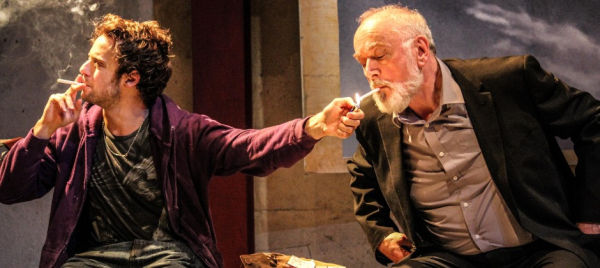
No two people could be more opposite to one another than
Jonah, a loud troubled young man, and Otto, an elderly and
disillusioned vicar born into wealth and trapped by loneliness.
The coming together of these two lost and lonely men at opposite ends
of their lives is the theme of Yorkshire playwright Robert Holman‘s
[show:43278]], which was first performed in Manchester in 2008, and
is now getting its first London run at the Park Theatre.
The two men speak Holman's snappy dialogue on a bare stage surrounded by a concrete set designed by
Simon Bejer with minimal props; and gradually, as they discuss life,
love and religion, aspects of their personalities narrow into focus.
This is a personal journey into the minds of two people who are both
struggling to come to terms with who they are; together they question whether God exists, what love is and try to
find ways of coping with the hardships life has thrown at them.
As the two men open up to each other it would seem that, like Stephen Dedalus and Leopold Bloom in Joyce’s
Ulysses, the two are each precisely what the other needs, but
undertones of homoeroticism and deception and the question of whether
either or both of them is merely trying to use or exploit the
vulnerabilities of the other make this an altogether more complex
relationship.
Peter Egan shows vast emotional depth as
Otto, an aging clergyman who has lost his faith and is tortured by his
religious commitments. His weathering by the world can be contrasted
with Jonah who, despite being young, has also experienced much
hardship in life.
Alex Waldmann captures both the strength and the weakness of Jonah, a
troubled 26-year-old trying to be a good father and carting his infant
daughter around with him in a trolley. It is a challenging role and
Waldmann gets the balance between Jonah’s vulnerability and his
abrasiveness just right, making him both likeable and, at the same
time, repulsive.
If the play has a weakness it's that Holman is, first and foremost, a
wordsmith, and some of the subtleties of language in his script appear
to have been lost in Tim Stark‘s production. However, the pace picks
up much more in the second half of the play, and it is fascinating to
watch the characters find themselves through discovering each other.
This play is an entertaining piece of theatre that raises questions
about the decisions we make in our lives, and leaves you wondering, in
the end, whether the central characters, like the heroes of classical
tragedy before them, are doomed because of a fatal flaw in their
nature for which they are not responsible and from which they can
never free themselves.












